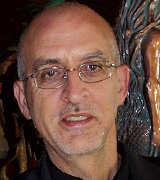- FOKION AVGERINOS – DR. IKE: Athletic Director, Youth Mentor, and Healer
- American Hellenic Institute’s Golden Jubilee Celebration
- Leadership 100 Concludes 33rd Annual Conference in Naples, Florida
- Louie Psihoyos latest doc-series shocks the medical community The Oscar–winning director talks to NEO
- Meet Sam Vartholomeos: Greek-American actor
Teach our children well

Dimitri C. Michalakis
When I was growing up Greek in America (and Canada) my father was the principal of the Greek parochial schools I attended: Socrates in Montreal and Plato in Chicago.
And it was a study in contrasts. Socrates, at its inception when my father had the bad luck to be there, was the former rectory of the local Protestant church and it creaked and rattled and steamed in the winter and our playground was the backyard where the neighboring women used to hang their clothes to dry in the warmer months. The school was instituted by the self-made bigwigs of the community (led by a man with no education but plenty of money who my father called Khrushchev—because he looked like him and acted like him). Meanwhile, the teachers taught at starvation wages (the Greek teachers were invariably widows or spinsters) and some of the pupils literally starved (one kid brought lunch every day that was a crust of bread dipped in oil) while the parish fathers were busy cooking up plans for a glorious new church in the suburbs.
Plato School in Chicago, in contrast, was the gem of the archdiocese and both a marvelous place to teach and a marvelous place to attend as a student. The wages were not spectacular but many teachers I remember were spectacular and the school was so immaculate and an ornament to the community that Jesse Jackson—then a young street activist with an Afro to match—surrounded the schoolyard one day and demanded to know from my father why the school was only for Greek kids. “Because their fathers and grandfathers built it with their sweat and blood,” my father told him.
From those heights my father came to New York and found the Greek parochial school climate in a byzantine shambles: People more interested in status and titles than supporting the school. Schools left to wither in once-thriving ethnic neighborhoods. New schools built during internecine warfare over who would get the credit and whose name would go on the outside. And when the school was built—nobody came. There was no money to pay any but novice teachers. The fathers of the community themselves often took their kids to outside schools, skeptical of their own product.
We did a report a few years ago about the state of education in our Greek parochial schools in America. The conclusion? The ones that still survived were operating only because they were taking in students of all persuasions: Russians, Serbians, Pakistanis, Indians, Bangladeshi—any persuasion that would pay the tuition and be willing to suffer the obligatory class in Greek to satisfy members of the parish that they still supported Greek education.
Greek education in America has been dying for years and will continue to wither. The church never could and even more so now can’t sustain it alone—there must be a concerted effort to fund Greek education and this doesn’t necessarily mean shelling out money for schools in neighborhoods where nobody will send their kids anyway. It calls for new ideas and a partnership of people who know about education and people willing to support it. A subsidized visit to Greece, for example, for any kid could mean more than years of droning Greek lessons taught in decrepit old buildings left behind like the haunted mansions of all those poor immigrants who built them with their sweat and blood and hope that they were leaving behind a legacy to their children and grandchildren.











0 comments